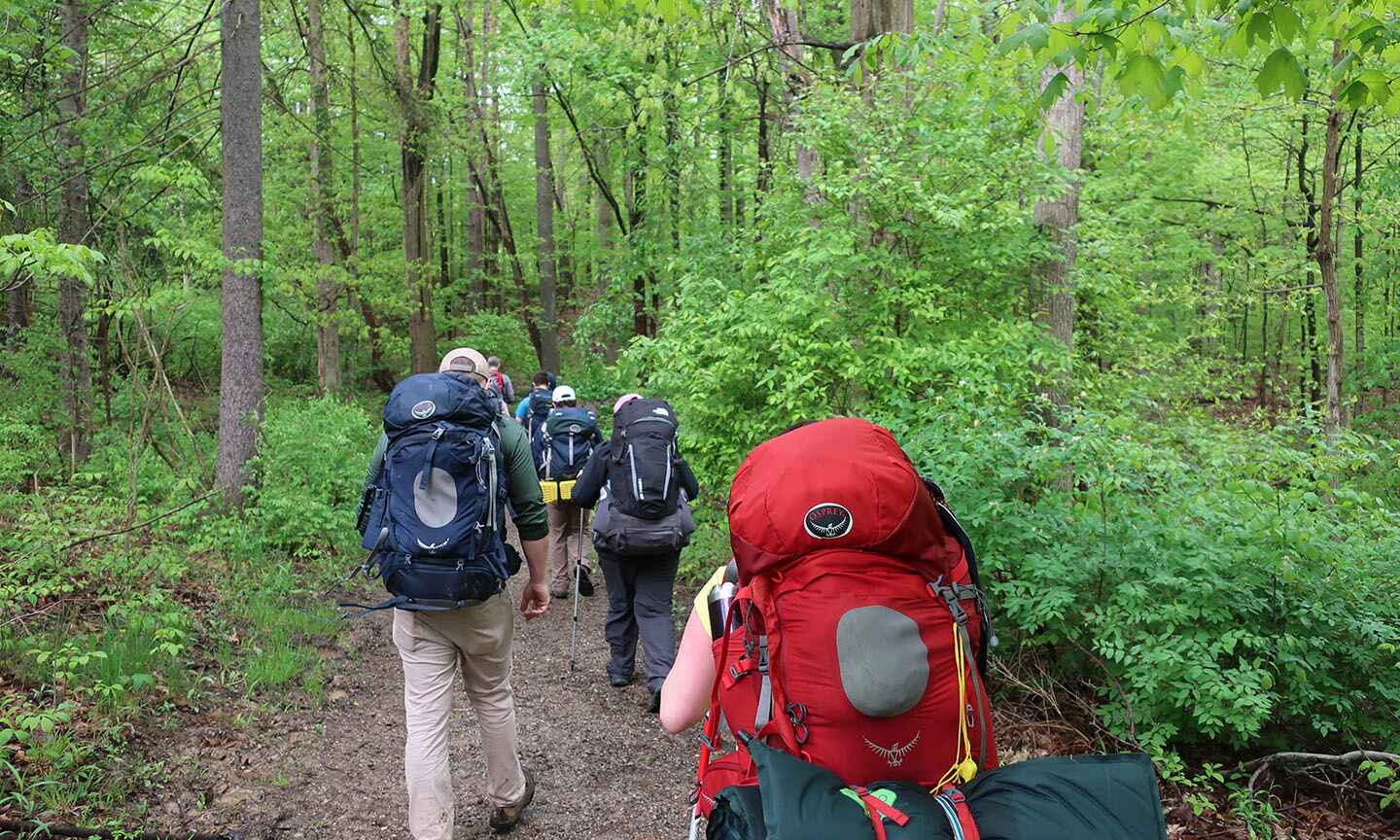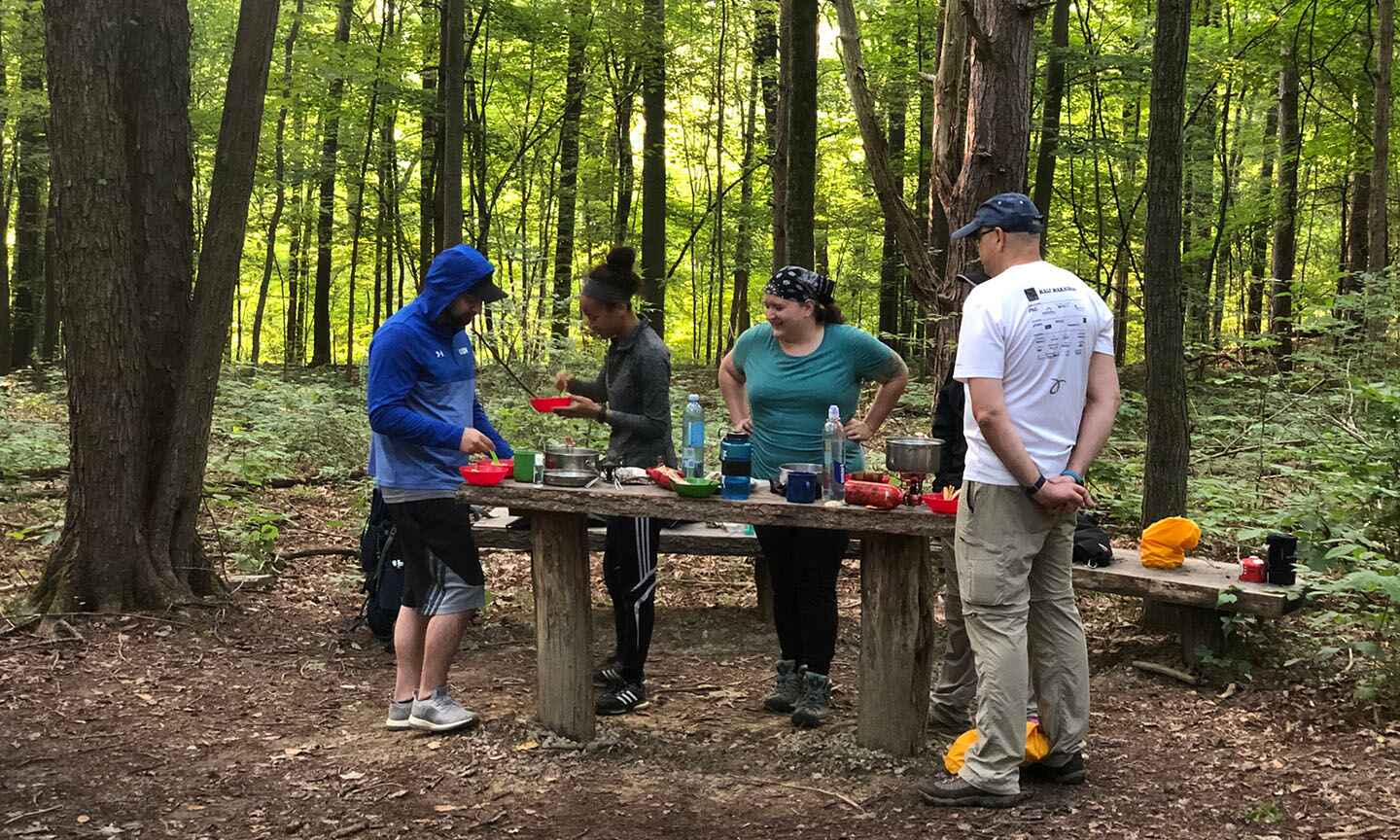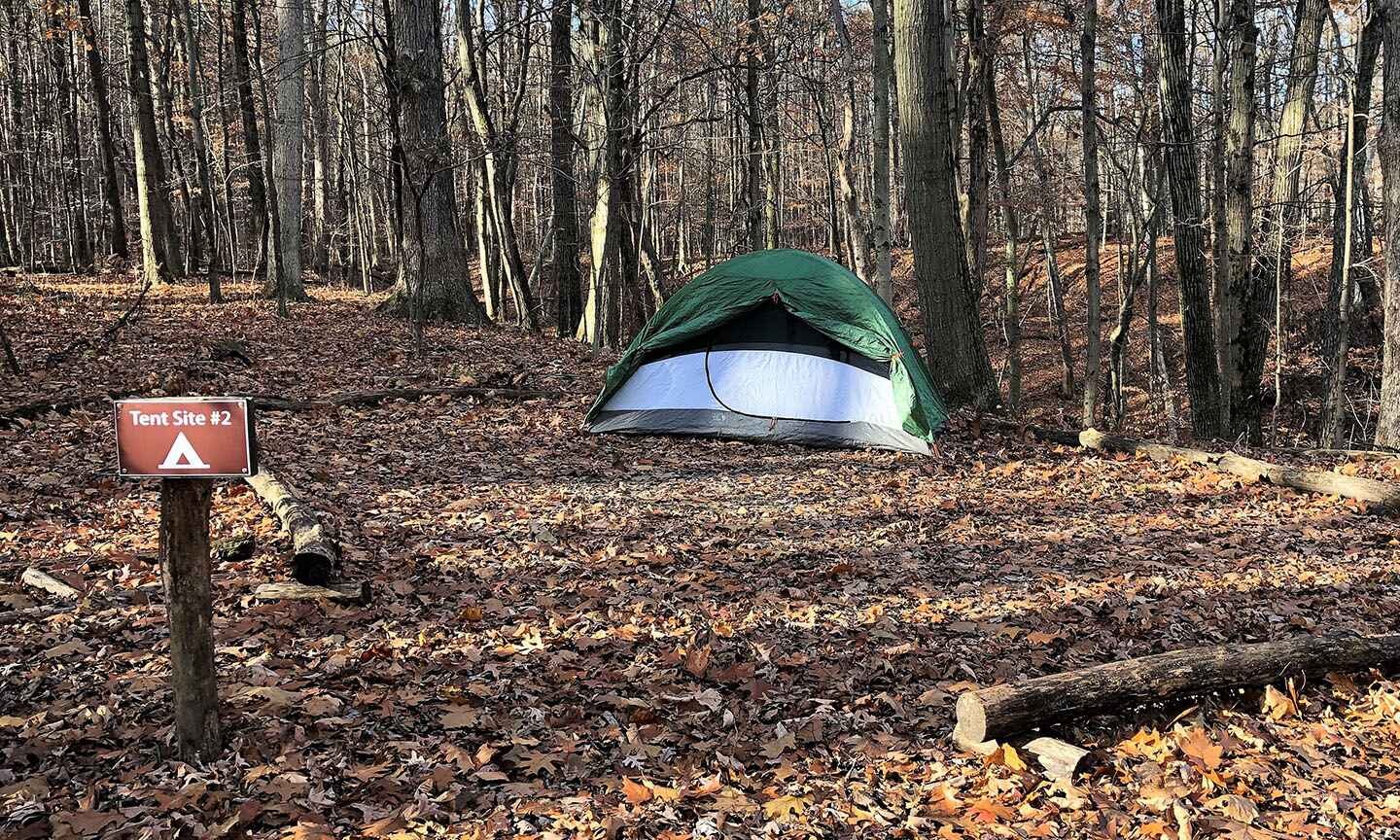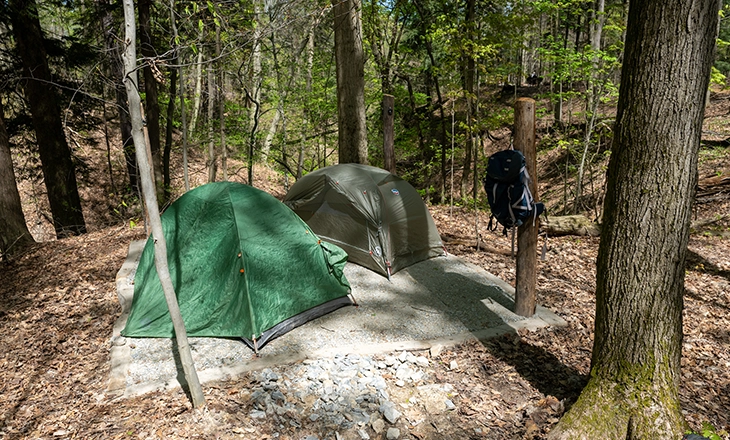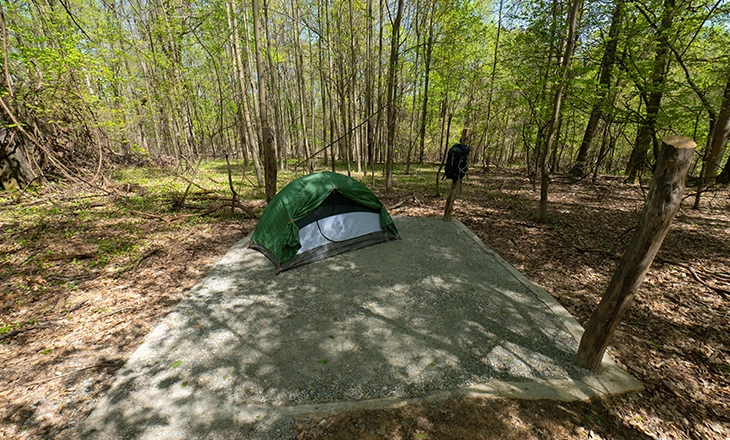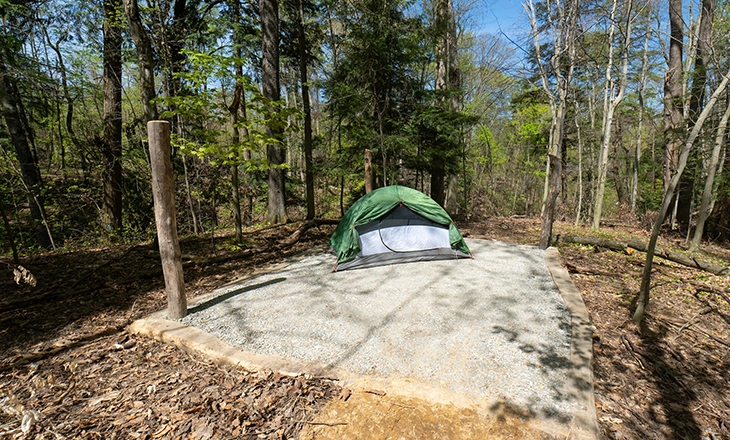Choose your next backcountry adventure, whether it’s a three hour introductory backpacking class, a guided multi-night trip, or your own planned adventure using Cleveland Metroparks Backcountry Sites. Discover how to reserve a backcountry site, site etiquette or how to register for a backpacking program below.
Click here for Backpacking Programs
Backcountry Facilities in Cleveland Metroparks
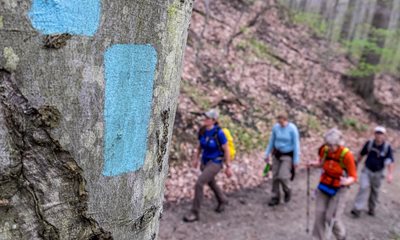 Did you know Ohio hosts a trail that circumnavigates the state continuing for over 1,400 miles? The Buckeye Trail wanders through 5 of Cleveland Metroparks Reservations. Whether you're thru-hiking the Buckeye Trail or just getting out for a night under the stars, the Leave No Trace-focused, educational backcountry sites will inspire exploration. Reserve your hike-in “rustic” backcountry site today!
Did you know Ohio hosts a trail that circumnavigates the state continuing for over 1,400 miles? The Buckeye Trail wanders through 5 of Cleveland Metroparks Reservations. Whether you're thru-hiking the Buckeye Trail or just getting out for a night under the stars, the Leave No Trace-focused, educational backcountry sites will inspire exploration. Reserve your hike-in “rustic” backcountry site today!
Obtaining a permit
Permits are required and must be booked at least 2 days in advance of stay. All sites are hike-in only, are a maximum of one-night stay and require a permit. Reserve your backcountry site by following the links below. Choose a Backcountry Site to determine availability, read the rules and regulations, and obtain a permit at one of Cleveland Metroparks 2 backcountry site locations:
- Ottawa Overlook Backcountry Sites
- Williams Woods Backcountry Sites
Ottawa Overlook Backcountry sites, Brecksville Reservation - available year-round
These Leave No Trace backcountry sites feature designated tent sites, a group kitchen area and a food storage area to hang food in a critter safe manner. Ottawa Overlook Backcountry Sites reside about a 0.25 miles from Ottawa Point Picnic Area just off the Buckeye Trail. The backcountry sites include three tent sites. A maximum 4 individuals or two tents can stay at each site.
Please note:
- These backcountry sites are designed for users to hike-in carrying equipment. when parking in Cleveland Metroparks, guests should expect to hike at least 3 miles to their tent site.
- Guests are not permitted to park at Ottawa Point Picnic Area. Overnight parking by permit is available in Brecksville Reservation at:
- Brecksville Nature Center parking lot (about 3.1 miles to the backcountry sites).
- Plateau Picnic Area (about 3.4 miles to the backcountry sites).
- Parking location must be specified when obtaining a permit. Vehicles can't be parked for more than 1 night.
Maps and other information:
Ottawa Overlook Backcountry Site Map
Brecksvillle Reservation Trail Map
WILLIAMS WOODS BACKCOUNTRY SITES, NORTH CHAGRIN RESERVATION - AVAILABLE YEAR-ROUND
These Leave No Trace backcountry sites feature designated tent sites, a group kitchen area, and a food storage area to hang food in a critter safe manner. Williams Woods Backcountry Sites reside about 0.5 miles from Forest Picnic Area just off the Buckeye Trail.
The backcountry sites include three tent sites. A maximum of 4 individuals or two tents can stay at each site.
Please note:
- These backcountry sites are designed for users to hike-in carrying equipment. When parking in Cleveland Metroparks, guests should expect to hike at least 2.6 miles to their tent site.
- Guests are NOT permitted to park at Forest Picnic Area. Overnight parking by permit is available in North Chagrin Reservation at:
- Strawberry Picnic Area (about 2.6 miles to the backcountry sites).
- Parking location must be specified when obtaining a permit. Vehicles can’t be parked for more than 1 night.
Maps and other information:
Williams Woods Backcountry Site Map
North Chagrin Reservation Trail Map
Backcountry site basics
Be prepared for unexpected weather or events keeps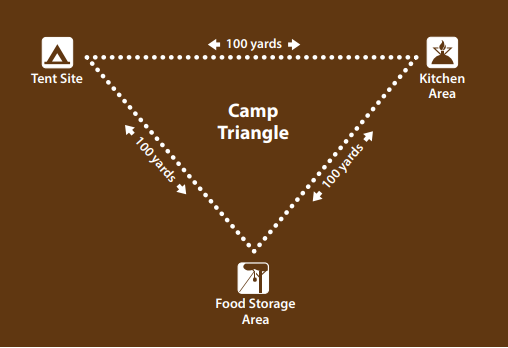 you safe and preserves the natural area in which you plan to enjoy. The backcountry sites are modeled after the classic Leave No Trace Camp TRIANGLE (food storage, kitchen area and tent sites), with the goal of minimizing our impact to the area and its inhabitants. Read below to discover the points of the Leave No Trace Camp Triangle!
you safe and preserves the natural area in which you plan to enjoy. The backcountry sites are modeled after the classic Leave No Trace Camp TRIANGLE (food storage, kitchen area and tent sites), with the goal of minimizing our impact to the area and its inhabitants. Read below to discover the points of the Leave No Trace Camp Triangle!
Food Storage
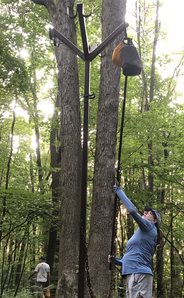 To protect both your food and wildlife, food should be hung using the designated food hangers when not actively cooking and especially while you are sleeping. Animals that are fed or obtain food from improper campsite usage will become a nuisance, even chewing through gear to obtain a tasty treat. This can easily be avoided by using the provided food hangers.
To protect both your food and wildlife, food should be hung using the designated food hangers when not actively cooking and especially while you are sleeping. Animals that are fed or obtain food from improper campsite usage will become a nuisance, even chewing through gear to obtain a tasty treat. This can easily be avoided by using the provided food hangers.
An easy way to do this is to hang all food and scented items such as toothpaste or soaps in a dry bag. Items that can't be hung in this way shouldn't be brought to these sites. No coolers are allowed.
Kitchen AREA
Good backcountry kitchen habits are essential in preserving backcountry campsites and natural spaces. Food preparation should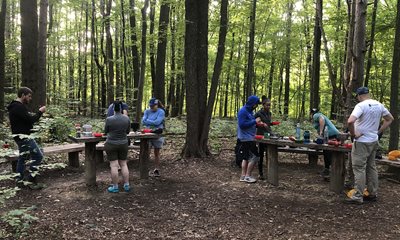 always be separated from where food is stored and where you plan to sleep. In this way, if animals are attracted by the scents left behind by cooking food, there is not an easy pantry of food for them to access. Remember to minimize food particles left behind, pack out trash, and dispose of wastewater at least 200 feet away from camp, trails, and any water sources.
always be separated from where food is stored and where you plan to sleep. In this way, if animals are attracted by the scents left behind by cooking food, there is not an easy pantry of food for them to access. Remember to minimize food particles left behind, pack out trash, and dispose of wastewater at least 200 feet away from camp, trails, and any water sources.
Cooking is by backcountry stove only. Cleveland Metroparks backcountry sites prohibit the use of campfires to limit over browsing and damage to trees and biotic soil. Charcoal goals are not allowed.
All 3 tent sites share the group kitchen area.
TENT SITES
Hike camp, and cook in designated areas only. Use the designated trail to access the backcountry sites and camp inside the marked tent areas. This minimizes erosion and habitat degradation. Each site is designed to accommodate a maximum of 4 individuals or 2 tents. Use of hammocks and clotheslines are only allowed on the designated posts at each site.
PROGRAMS AND GUIDED TRIPS
Whether you are just beginning or you want to enhance your menu in the backcountry, there are educational opportunities for all experience levels. Explore Outdoor Recreation’s program series to find your next backcountry adventure.
Backpacking programs and trips are focused on educating participants to be independent backpackers. Our experienced instructors will meet with participants beforehand to discuss the trip destination and itinerary, packing lists, learn about meal planning and packing a backpack. Equipment is provided for trips.
These trips range from 1 night in the wilderness on a Beginner Backpacking trip to 4 or 5 nights on the Intermediate and Advanced trips. Terrain level will also vary in difficulty across trip levels.
To enhance your backcountry experience, discover our backpacking series. These topics range from backcountry cooking to learning map and compass. For questions about trips or programs call 216-341-1704.
Backpacking Basics:
A classroom type experience focusing on an introduction to backpacking gear, campsite set-up, and safety.
Beginner Backpacking Trip:
A short entry-level trip focused on learning the basics in a beautiful location.
Intermediate Backpacking Trip:
A multi-day guided trip focused on trip planning and gaining the experience to become an independent backpacker.
Backcountry Cooking:
Add to your backcountry cookbook learning tips and tricks along the way.
Land Navigation 1&2:
Gain confidence reading maps, learn to use a compass and unite it with a map.
Additional Information:
- Learn more about the Buckeye Trail or find maps
- Nearby attractions
Parks
-
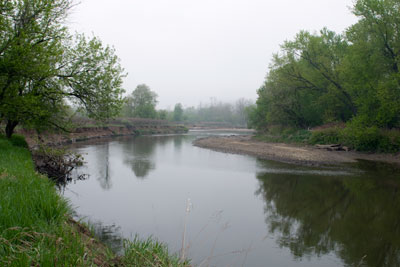
Brecksville Reservation
From the oak-hickory forests on the ridge tops to the cottonwoods, willows and sycamores of Chippewa Creek's flat floodplain, Brecksville Reservation is a study of contrasts. The reservation is deeply...
Attractions
-
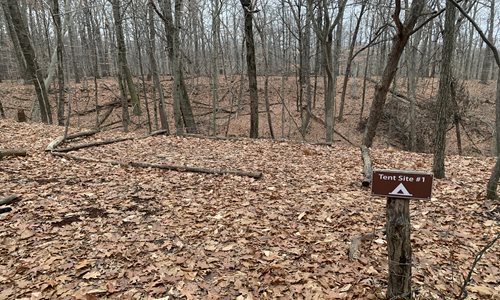
Ottawa Overlook Backcountry Site 1
Site 1 is nestled inside of the backcountry site’s camp triangle most proximal to the kitchen area and food storage areas. The 12’ x 17’ designated tent area is a defined natural surface area that can... -
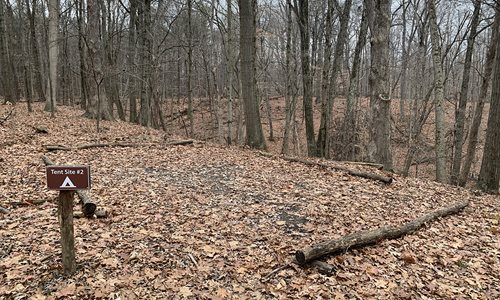
Ottawa Overlook Backcountry Site 2
Site 2 overlooks the ridge allowing you to wake up to gorgeous views outside of your vestibule. The slightly larger 16’ x 22’ designated tent area is a defined natural surface area that can accommodat... -
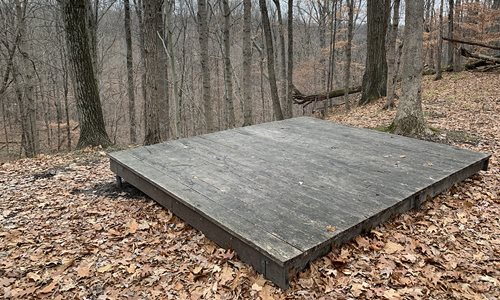
Ottawa Overlook Backcountry Site 3
Site 3 features a wooden tent platform that can accommodate one 4-person tent or two small 2-person tents. The 10’ x 12’ designated tent area sits in solitude, and is the furthest from sites 1 and 2,...

